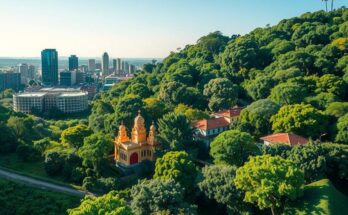Prime Minister Albin Kurti’s ruling Vetevendosje party is projected to secure the most seats but lacks a majority in Kosovo’s parliamentary election. Opposition parties, including PDK and LDK, aim to boost the economy, while Kurti pursues diminished Serbian influence. Coalition negotiations are anticipated as Kosovo navigates its political landscape amidst regional tensions stemming from recent conflicts with Serbia.
In a recent parliamentary election in Kosovo, Prime Minister Albin Kurti’s ruling party, Vetevendosje (VV), is projected to secure the most seats, approximately 41% of the votes counted thus far. However, according to the election commission, VV will not attain the majority necessary to form a government. This electoral battle was characterized by Kurti’s push to diminish Serbian influence in Kosovo, contrasting with the opposition’s campaign focused on economic improvement in this impoverished region in Europe.
Without a clear majority in the 120-seat parliament, Kosovo faces a likely period of coalition negotiations and political maneuvering before a new government can be established. Of the total seats, 20 are designated for minority representation, including 10 for Kosovo’s ethnic Serbs. The second and third positions in the election appear to be held by the right-wing Democratic Party of Kosovo (PDK) with 22% and the Democratic League of Kosovo (LDK) with 17% of the votes, respectively, amidst a voter turnout of around 40%.
Historically, the PDK and LDK have collaborated to form coalition governments following mediation from the international community since Kosovo’s independence. Prior to the election, Kurti suggested he would prefer to lead the opposition if no majority emerged for his party. Nonetheless, upon initial results, he expressed determination to attempt to form a government, congratulating his supporters on their victory.
The conduct of the election faced challenges due to reported technical malfunctions with the vote-counting software, delaying the announcement of results. However, these issues were addressed, and the official results were available on the election commission’s website the following morning. Kurti’s administration marks the first complete term since Kosovo’s independence declaration, although his term has not been without controversy.
Elevated tensions characterized Kurti’s earlier governance, particularly after failed negotiations with Serbia in March 2023, which led to violent confrontations involving NATO peacekeepers and heightened regional tensions. Furthermore, Kurti’s government has actively worked to eliminate Serbian institutions and influence in Kosovo, including the closure of various Serbian-controlled entities, such as banks and postal services, and the prohibition of Serbian currency.
Throughout these tumultuous developments, Kurti has consistently maintained his stance despite potential repercussions from essential allies in the United States and Europe. He insists on his approach in pursuit of Kosovo’s national interests, as the country continues navigating its complex political landscape.
In recent years, Kosovo has been navigating tensions with Serbia following its declaration of independence in 2008. The political climate remains sensitive, as governing bodies engage in negotiations and grapple with national identity and ethnic divides. The election of February 2023 serves as a focal point for these longstanding issues, particularly regarding the influence of Serbia in Kosovo. Prime Minister Albin Kurti’s administration represents a significant commitment to assert Kosovo’s autonomy, even amid opposition and international pressures.
In conclusion, Kosovo’s latest parliamentary election reveals a complex political scenario, with the ruling party securing the most votes but falling short of a majority to govern. This election is crucial for determining future coalition dynamics, particularly with historical rivalries present. As Kosovo grapples with its identity and external influences, continued negotiations and political strategies will shape its future governance and stability.
Original Source: www.lemonde.fr




